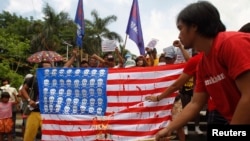MANILA —
Filipino activists protested in Manila Friday, three days before a scheduled state visit of President Barack Obama.
The visit is the final leg of Obama's four-nation tour of U.S. allies in Asia.
The U.S. and Philippine governments are set to sign a recently drafted military agreement that would boost the presence and movement of American troops in the island nation.
Chanting nationalist slogans and bearing anti-U.S. placards near a monument to a national hero, activists set alight a mock American flag emblazoned with skulls instead of stars.
“Our nation has been subjected to foreign domination for 116 years. And the United States has continued to drag us into its wars, greatly affecting the Filipino people,” said Mark Louie Aquino, secretary-general of the Metro Manila chapter of the New Patriotic Alliance (Bagong Alyansang Makabayan) activist group.
On the heels of the Philippines' recent tensions in territorial disputes with China, the protesters have voiced strong opposition to the U.S. defense pact, saying that the move to increase foreign access to military facilities will further threaten Philippine sovereignty and do little to counter a rising China.
“We call on our Filipino brothers and sisters, do not depend on another imperialist power such as the U.S. to defend ourselves against a regional bully like China. The Philippines must stand clearly, independently, firmly, progressively, in sovereignty and in solidarity, with the rest of the peaceful peoples of the world. We should not depend on another war power to wage war against another war power,” said Rasti Delizo, political coordinator of the Sanlakas (Unified Strength) group.
Members of Sanlakas marched towards the U.S. embassy to demonstrate, but were stopped by dozens of policemen.
Obama's four-nation visit, which also includes stops in Japan, South Korea and Malaysia, aims to convince allies that the U.S. pivot of military and diplomatic assets to Asia is real.
Manila's acceptance of a beefed-up U.S. military presence, a politically sensitive issue in the independent-minded archipelago nation, would reveal the scale of Philippine anxiety over China amid disputes in the South China Sea.
While sticking to a U.S. refusal to take sides in the maritime disputes, Obama will seek to reassure South Korea, Japan and the Philippines that Washington is “fully committed to our defense treaties” with them, a U.S. official said.
The administration has promised that the United States will reposition naval forces so that 60 percent of its warships are based in Asia-Pacific by the end of the decade, up from about 50 percent now. But as the U.S. military budget contracts, that likely would represent part of a shrinking U.S. defense pie.
The visit is the final leg of Obama's four-nation tour of U.S. allies in Asia.
The U.S. and Philippine governments are set to sign a recently drafted military agreement that would boost the presence and movement of American troops in the island nation.
Chanting nationalist slogans and bearing anti-U.S. placards near a monument to a national hero, activists set alight a mock American flag emblazoned with skulls instead of stars.
“Our nation has been subjected to foreign domination for 116 years. And the United States has continued to drag us into its wars, greatly affecting the Filipino people,” said Mark Louie Aquino, secretary-general of the Metro Manila chapter of the New Patriotic Alliance (Bagong Alyansang Makabayan) activist group.
On the heels of the Philippines' recent tensions in territorial disputes with China, the protesters have voiced strong opposition to the U.S. defense pact, saying that the move to increase foreign access to military facilities will further threaten Philippine sovereignty and do little to counter a rising China.
“We call on our Filipino brothers and sisters, do not depend on another imperialist power such as the U.S. to defend ourselves against a regional bully like China. The Philippines must stand clearly, independently, firmly, progressively, in sovereignty and in solidarity, with the rest of the peaceful peoples of the world. We should not depend on another war power to wage war against another war power,” said Rasti Delizo, political coordinator of the Sanlakas (Unified Strength) group.
Members of Sanlakas marched towards the U.S. embassy to demonstrate, but were stopped by dozens of policemen.
Obama's four-nation visit, which also includes stops in Japan, South Korea and Malaysia, aims to convince allies that the U.S. pivot of military and diplomatic assets to Asia is real.
Manila's acceptance of a beefed-up U.S. military presence, a politically sensitive issue in the independent-minded archipelago nation, would reveal the scale of Philippine anxiety over China amid disputes in the South China Sea.
While sticking to a U.S. refusal to take sides in the maritime disputes, Obama will seek to reassure South Korea, Japan and the Philippines that Washington is “fully committed to our defense treaties” with them, a U.S. official said.
The administration has promised that the United States will reposition naval forces so that 60 percent of its warships are based in Asia-Pacific by the end of the decade, up from about 50 percent now. But as the U.S. military budget contracts, that likely would represent part of a shrinking U.S. defense pie.





